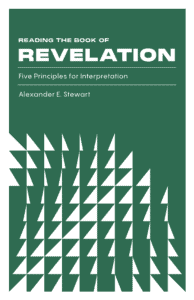
In this excerpt from Reading the Book of Revelation, Alexander Stewart lays out five foundational interpretive principles to help readers properly understand the book of Revelation.
The book of Revelation is often treated as an outcast among the books of the Bible—the family member that everyone else is embarrassed about and wishes would just not come to the canonical reunion. It is not that John is a heretic; he is just plain weird, and that makes everyone who reads his book slightly uncomfortable. How do you convince your friends that your family is normal with such an eccentric uncle? He is always going on about his bizarre visions of a seven-headed dragon, grotesque beasts, and hybrid locust-human-scorpion demonic tormentors being unleashed upon humankind. That is just the beginning; when he really gets going, he won’t stop talking about the seven seals, trumpets, and bowls that ravage and destroy the earth and its inhabitants. If it were up to him, your church’s children’s Christmas pageant would feature a ferocious dragon outside the stable waiting to devour sweet baby Jesus as soon as he was born (Rev 12:4–5). Most Christians consider it best to simply ignore him, especially if you are bringing new friends to the family reunion.
Revelation’s strangeness has led to widespread neglect among many Christians throughout history and around the world. These readers have a general sense that the book is probably important, but they prefer to leave it to the experts to figure things out. Such an approach misses out on the riches of the capstone book of the Bible. The main problem is that there are many competing interpretations of this beautiful and rich book, and some of the interpretations are more bizarre than the visions themselves. Ignoring it is certainly the easiest option, but such neglect comes at a cost. There are, of course, some who make the book of Revelation the center of their theology and spend all their time making and revising complicated charts of end-time events. These two extremes are common: ignore Revelation or obsess over it.
Depending on your past experience, it may be hard to think that it is possible to understand and properly interpret Revelation. Such understanding does require effort and study, but nothing valuable comes for free. The first step is to believe that Revelation can be understood well and could become a rich resource for your Christian journey. It could even become a book to enjoy instead of a book to avoid.
Finding a Way through the Maze
There is a successful path through the maze of Revelation’s visions. Drawing on sound interpretive practices and the church’s tradition of reading Scripture as a whole, this book will consider five rules that can help you navigate the challenges of this complicated-yet-rich book. These principles are the foundational starting point for properly understanding Revelation’s visions. A solid foundation makes the whole process of building a new home smoother and ensures that all the walls, floors, and fixtures fit together properly and work as intended. If you have a solid interpretive foundation in place, you will be able to work through the various visions and judge for yourself whether someone’s proposed interpretation of a particular vision is terrible, strange but possible, probable, or virtually certain. It is possible to approach these issues with confidence instead of fear or timidity.
Here are the five foundational interpretive principles:
- Focus on the original purpose of the visions. Revelation is primarily a motivational book, and when this truth is neglected, the whole point of the book is missed.
- Let the original historical context guide your interpretation. Revelation was written for you but not originally to you.
- Recognize repetition. Revelation consists of a series of visions that run roughly parallel to each other; each culminates in the end (Jesus’s return and the final judgment).
- Recognize symbolism. John’s visions are highly symbolic and need to be read as such.
- Read Revelation as Christian Scripture. This involves using the broader biblical context, especially the Old Testament, to interpret the book.
These five principles are not an exhaustive or final word about interpreting Revelation, but they are the foundational starting point. Mistakes at this foundational level have misled many readers and continue to breed misunderstanding and confusion today. Now, nothing in relation to Revelation is uncontested, and these points may seem to go against what you have been taught about the book in the past. If so, enjoy the adventure of putting on a new set of glasses for the first time; you may find that they improve your vision. The goal is to hear, understand, and put into practice in the present time what God revealed to his people long ago.
This post is adapted from Reading the Book of Revelation: Five Principles for Interpretation by Alexander E. Stewart (Lexham Press, 2021).







